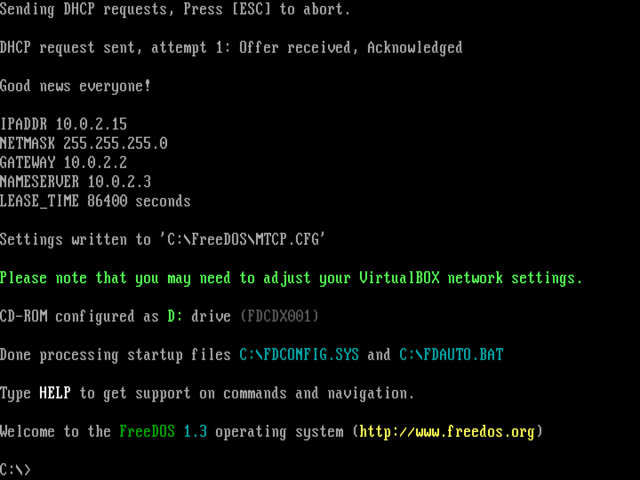Play classic games
You can play your favorite DOS games on FreeDOS. And there are a lot of great classic games to play: Wolfenstein 3D, Doom, Commander Keen, Rise of the Triad, Jill of the Jungle, Duke Nukem, and many others!

FreeDOS is an open source DOS-compatible operating system that you can use to play classic DOS games, run legacy business software, or develop embedded systems. Any program that works on MS-DOS should also run on FreeDOS.
You can play your favorite DOS games on FreeDOS. And there are a lot of great classic games to play: Wolfenstein 3D, Doom, Commander Keen, Rise of the Triad, Jill of the Jungle, Duke Nukem, and many others!
You can run your favorite DOS programs with FreeDOS. Or use FreeDOS to run a legacy DOS application. Just install your DOS program under FreeDOS like you would any DOS application and you'll be good to go.
FreeDOS includes lots of compilers, assemblers, and other programming tools so you can create your own DOS programs. You can also modify FreeDOS itself, because we include the source code under an open source license.
USBDDOS is a USB driver stack for DOS. It was originally named RWDDOS before released to public, which is only a driver for RetroWave OPL3, and later more drviers added (mouse, keyboard, disk) and renamed to USBDDOS. USBDDOS uses DPMI to perform PCI bus master DMA (MMIO), and also save conventional memory for other DOS programs. You can find the source code at USBDDOS on GitHub.
MicroWeb is a web browser for DOS that runs as a 16-bit real mode application and is designed to run on minimal hardware. Note that this has some limitations, including HTTP only, no JS or CSS, and only supports GIF images. MicroWeb 2.0 contains several improvements, such as: + Support for more video modes, including monochrome and colour modes + PNG and JPEG dimensions are loaded but not the content + Improved font rendering and better Unicode support + More HTML tag support. You can download the new version at MicroWeb ver 2.0 on GitHub.
VSBHDA provides SoundBlaster emulation for more modern computers that have HDA (and AC97/SBLive); this is a fork of crazii's SBEMU. Version 1.4 add several neat features and compatibility fixes, including: + added 16-bit protected-mode variant vsbhda16.exe + reworked HDA initialization code + Creative's diagnose.exe accepts vsbhda's SB emulation + DSP cmd 0x91 now handled correctly + direct DSP cmd 0x10 supported. You can find it at VSBHDA on GitHub, or more directly at VSBHDA releases.
Also: While it's unrelated to VSBHDA, you might be interested in SBDIAG to test SoundBlaster compatible sound cards, such as the Snark Barker for MCA.
Gregory Pietsch created libm, as a public domain math library for programming. Gregory writes about the new release: "For this version, I have worked on edge cases regarding complex numbers and dug deep into the C99 Standard." Please help test the library and provide feedback to Gregory, or reply to the freedos-devel email list. You can download the new version from the FreeDOS Files Archive at Ibiblio, under /devel/libs/libm
Did you know FreeDOS has a YouTube channel? The latest videos are about getting people interested in programming, like a program to make a Cylon "eye" move back and forth on the screen, and how to write a simple file viewer. We hadn't posted videos in a while, but previous videos from before the break included a comparison of Quattro Pro with a modern spreadsheet, a demonstration of video resolutions on DOS, how to use VIM on FreeDOS, and how to install Borland TurboC++ on FreeDOS. The channel also sometimes covers more general "retrocomputing" topics like a history of tech writing with ed and nroff, a look back at original style C, and using Linux like original Unix. For more, subscribe to the FreeDOS YouTube channel.
If you like "dungeon" style adventure games, you might be interested in Angband. Angband is a free, single-player dungeon exploration game, where you play an adventurer seeking riches, fighting monsters, and preparing for a final battle. Angband is open source software at the Angband website. Ben Collver has compiled a DOS version of Angband 4.2.5, which you can download at archive.org.